If you’re looking for the best educational puzzle games that make math fun and engaging, I’ve found some great options. From games like eeBoo Making Change that teach money skills, to Math Puzzle Sets and interactive card challenges for addition, subtraction, and multiplication, these puzzles promote strategic thinking, problem-solving, and confidence. Many offer adjustable difficulty levels, vibrant themes, and durable materials for repeated use. Keep exploring as I share more options to inspire your child’s learning journey.
Key Takeaways
- Many top educational puzzle games combine math skills with engaging themes, such as amusement parks or money management, to boost motivation.
- Popular options include foam puzzles, card challenges, and electronic devices that promote problem-solving and mental math.
- These games cater to various age groups, from early learners to pre-teens, offering age-appropriate difficulty levels.
- Durable, safe materials ensure long-lasting use in homes and classrooms, encouraging repeated practice.
- Incorporating interactive components and themed gameplay makes math fun while developing critical thinking and strategic skills.
eeBoo Making Change Game for Math and Money Skills
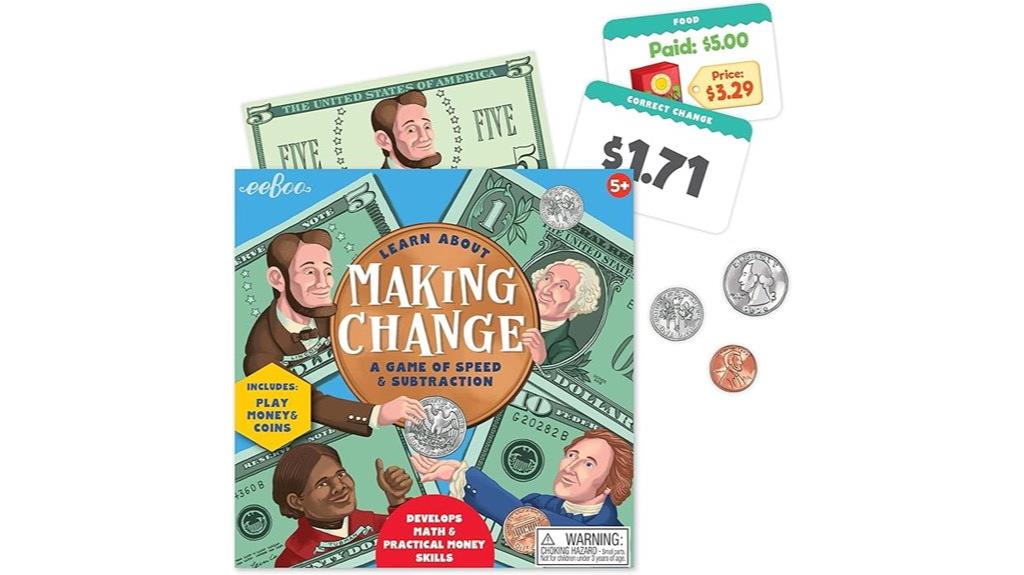
Are you looking for a fun, screen-free way to teach your kids essential math and money skills? The eeBoo Making Change Game is perfect for children aged 5 and up. It includes item cards, play money, and coins, encouraging kids to practice making change through mental math. The game promotes strategic thinking, money management, and social interaction while being eco-friendly, made from 90% recycled materials. Its flexible gameplay allows for different difficulty levels, making it suitable for a wide age range. With positive reviews and high ratings, this game is a fantastic tool for family learning and developing practical financial skills.
Best For: families and educators seeking an engaging, eco-friendly way to teach children aged 5 and up practical math and money management skills through fun, screen-free gameplay.
Pros:
- Promotes strategic thinking, money management, and social interaction in children
- Made with 90% recycled materials and printed with vegetable-based inks, supporting sustainability
- Flexible gameplay suitable for various ages and skill levels, encouraging learning at different difficulty settings
Cons:
- Punching out coins can be time-consuming, which may slow down setup or gameplay
- Requires space for play and storage of game components
- Some children may need guidance initially to understand the rules and strategies
Math Games for Kids 5-7, Addition and Subtraction Educational Games
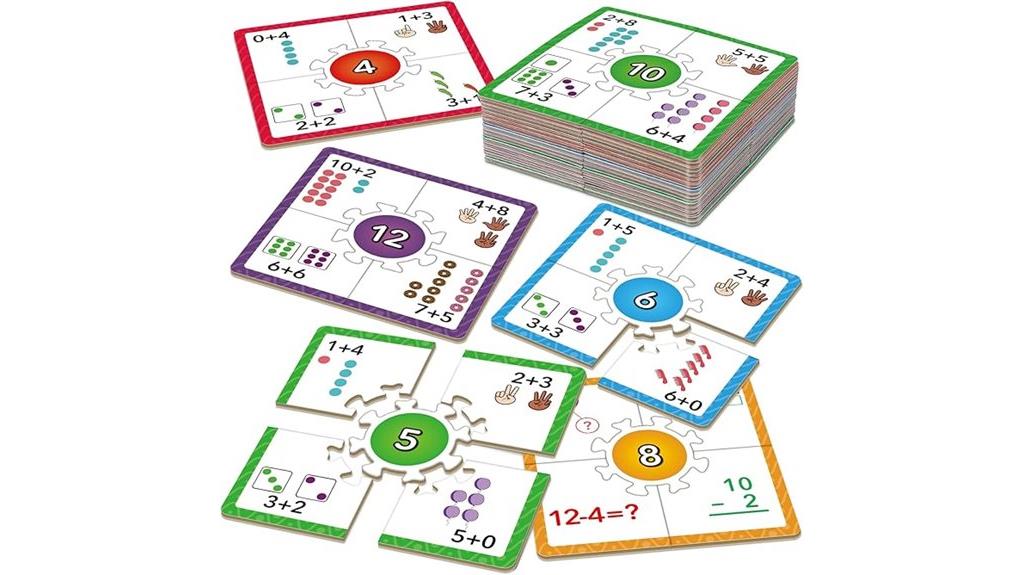
Educational puzzle games are an excellent choice for children aged 5 to 7 who are beginning to explore addition and subtraction. These self-correcting puzzles feature interlocking joints that guarantee correct fits, boosting confidence and self-checking skills. The center pieces display answers, while surrounding pieces have math problems, making learning interactive and fun. Their durable, rounded design prevents injuries and allows for repeated use at home or school. Plus, the included storage bag makes organization easy. Kids develop calculation, logical thinking, and problem-solving skills naturally through vivid illustrations and hands-on play, making math engaging and less intimidating for young learners.
Best For: young children aged 5 to 7 who are beginning to learn addition and subtraction and need a fun, interactive way to develop their math skills.
Pros:
- Self-correcting design promotes independence and confidence in problem-solving.
- Durable, rounded corners ensure safety and longevity for repeated use.
- Comes with a storage bag for easy organization and portability.
Cons:
- Sometimes children may rely on matching colors instead of solving problems, which could reduce the learning effectiveness.
- Limited to basic addition and subtraction, which may not challenge more advanced learners.
- Slightly larger size may require more space for storage or play areas.
Adsumudi Math Game for Kids Ages 8-12
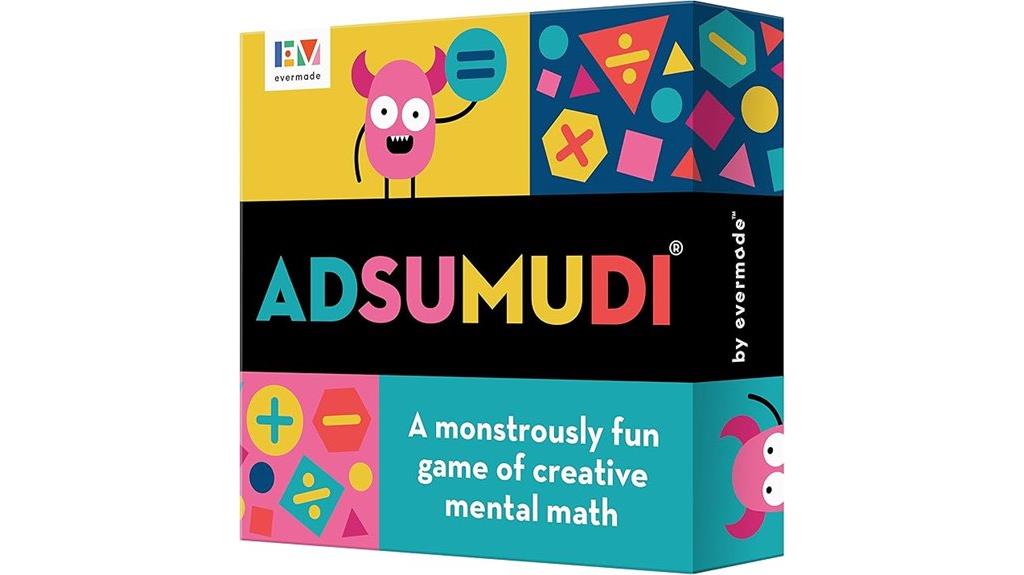
If you’re looking for a math game that truly engages kids aged 8-12, the Adsumudi Math Game stands out as an excellent choice. It offers a fun, interactive way for children to practice key skills like multiplication, division, addition, and subtraction, making math feel less like a chore. With 52 double-sided cards and 416 unique challenges, the game adapts to different skill levels through star-rated difficulty, ensuring it’s suitable for a wide range of learners. Perfect for family nights, homeschooling, or classroom use, it promotes mental math, strategic thinking, and problem-solving—all while keeping kids entertained and motivated.
Best For: families, teachers, and homeschoolers seeking an engaging, adaptable math game for children aged 8-12 to build mental math skills and strategic thinking.
Pros:
- Offers 416 unique challenges across multiple skill levels to keep children engaged and challenged
- Versatile gameplay options including competitive, collaborative, and online modes suitable for various settings
- Durable, high-quality cards made in Michigan ensure long-lasting use and reliability
Cons:
- Recommended for ages 9 and up, so younger children may find some challenges less accessible
- Requires space for gameplay, which might be limited in small environments
- May need adult guidance initially to fully understand and maximize the game’s educational benefits
1-20 Number Puzzles for Toddlers and Kids
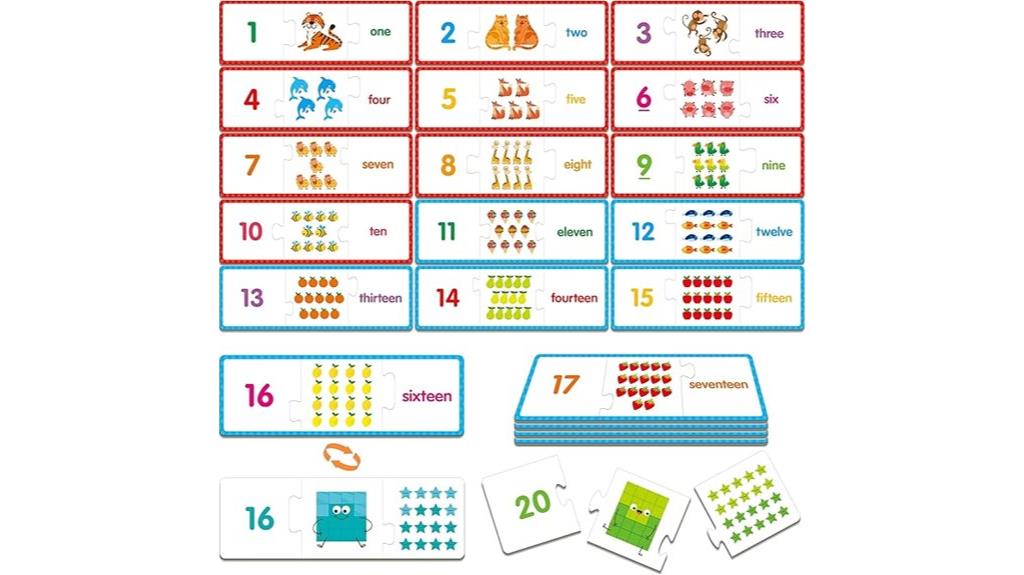
These 20 number puzzles are perfect for preschoolers beginning to explore early math skills. Each set features self-correcting, three-piece puzzles representing numbers 1 to 20, making learning engaging and manageable. The double-sided design shows numerals, objects, and words, helping kids recognize numbers, count, and build vocabulary. Bright colors and adorable illustrations keep children focused and excited to learn. The puzzles’ sturdy material and safe, rounded edges guarantee durability and safety for little hands. By encouraging independent play, these puzzles boost problem-solving, critical thinking, and confidence, laying a solid foundation for future math learning in a fun, interactive way.
Best For: preschool children aged 3-5 who are beginning to learn numbers, counting, and early math skills in classroom or home settings.
Pros:
- Self-correcting design helps children learn independently and build confidence
- Bright colors and adorable illustrations enhance engagement and focus
- Made from durable, safe materials with rounded edges for long-lasting, safe play
Cons:
- Limited to numbers 1-20, may require additional tools for advanced learners
- Small puzzle pieces could pose a choking hazard if not supervised with very young children
- May need adult assistance for younger children to fully understand the concepts initially
Number Hunter Math Board Game for Kids Ages 4-8
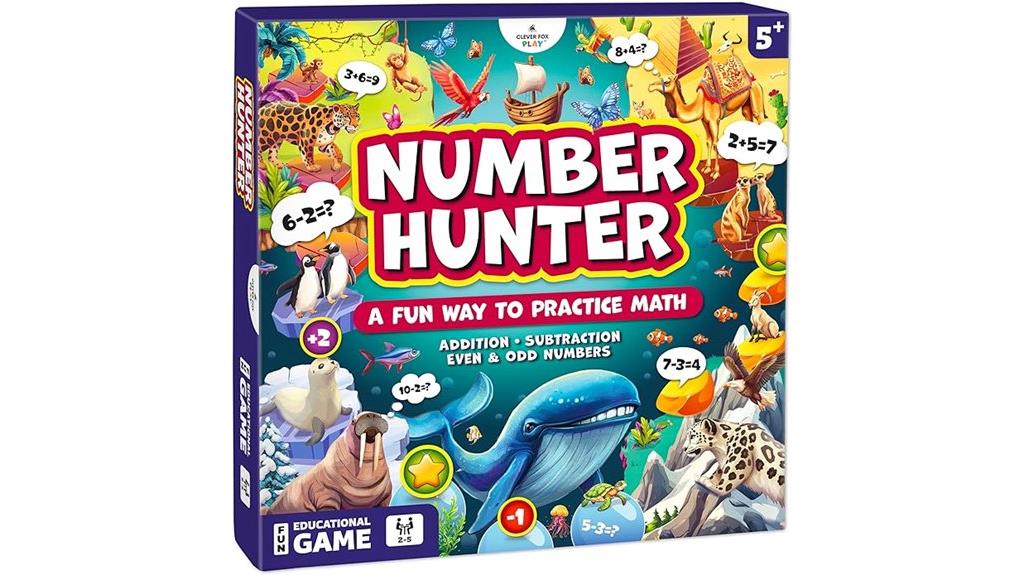
Looking for a fun way to help your young child build essential math skills? The Number Hunter Math Board Game for Kids Ages 4-8 makes learning addition and subtraction exciting. Designed for kids from kindergarten to third grade, it boosts math confidence, number recognition, and basic arithmetic through engaging gameplay. With themed cards, movement challenges, and interactive activities like spinning and jumping, children stay focused and entertained. Made from safe, durable materials, it’s perfect for home, school, or family game nights. Its high ratings and popularity prove it’s an effective, enjoyable tool to reinforce STEM concepts while having fun.
Best For: parents, teachers, and homeschoolers seeking an engaging, safe, and effective way to teach addition and subtraction to children aged 4-8.
Pros:
- Promotes math confidence and foundational skills through fun, interactive gameplay
- Durable, non-toxic materials ensure safety and long-lasting use
- Versatile for home, classroom, and family game nights, suitable for a range of skill levels
Cons:
- May require adult supervision for younger children to fully understand the rules
- Limited to basic addition and subtraction, not suitable for more advanced math concepts
- Small components could pose a choking hazard if not used carefully by very young children
Number Park – Addition & Subtraction Math Games for Kids Ages 5-8

Number Park stands out as an ideal choice for children aged 5 to 8 who are developing their addition and subtraction skills through engaging, hands-on gameplay. This colorful board game combines a vibrant amusement park theme with educational fun, including 78 flash cards and four skateboard pieces. Created by an elementary teacher, it promotes confidence and a love for math by supporting diverse skill levels and encouraging inclusive participation. Perfect for home, classroom, or after-school use, Number Park fosters strategic thinking, friendly competition, and real-world math practice. It’s a wonderful gift that makes learning math interactive, accessible, and enjoyable for young learners.
Best For: children aged 5 to 8 who are learning addition and subtraction and enjoy colorful, interactive educational games.
Pros:
- Engaging amusement park theme makes learning fun and visually appealing
- Supports diverse skill levels and promotes inclusive participation
- Encourages strategic thinking and confidence in math skills
Cons:
- May require adult supervision or guidance for some younger children
- Relies on physical components that could be lost or damaged over time
- Bilingual instructions, while helpful, may be confusing for some users without support
The Original Math Genius Game: Educational Addition, Subtraction, Multiplication & Division Board Game

If you’re seeking an engaging way to strengthen your child’s math skills, The Original Math Genius Game is an excellent choice, especially for elementary to middle school students. This educational board game covers addition, subtraction, multiplication, and division, making math practice fun and interactive. It offers versatile gameplay options, including competitive and solo modes, with adjustable difficulty levels for different skill sets. With high-quality components and over 128 cards, it provides endless replayability. Kids enjoy the challenge, and teachers and parents appreciate its ability to boost problem-solving, strategic thinking, and math fluency. It’s a practical, entertaining tool for making math learning enjoyable.
Best For: elementary to middle school students, teachers, and parents seeking a fun and effective way to improve math skills through engaging gameplay.
Pros:
- Promotes cognitive development and problem-solving skills in addition to basic math operations.
- Versatile gameplay options including competitive and solo modes, suitable for various skill levels.
- High-quality components with 128 cards ensuring durability and endless replayability.
Cons:
- Instructions may initially seem confusing, requiring some players to familiarize themselves with the rules.
- The game’s size and components might be less portable for travel or on-the-go play.
- Some users may find the variety of rules and modes a bit overwhelming at first.
Math Games for Kids – Flash Cards for Kids
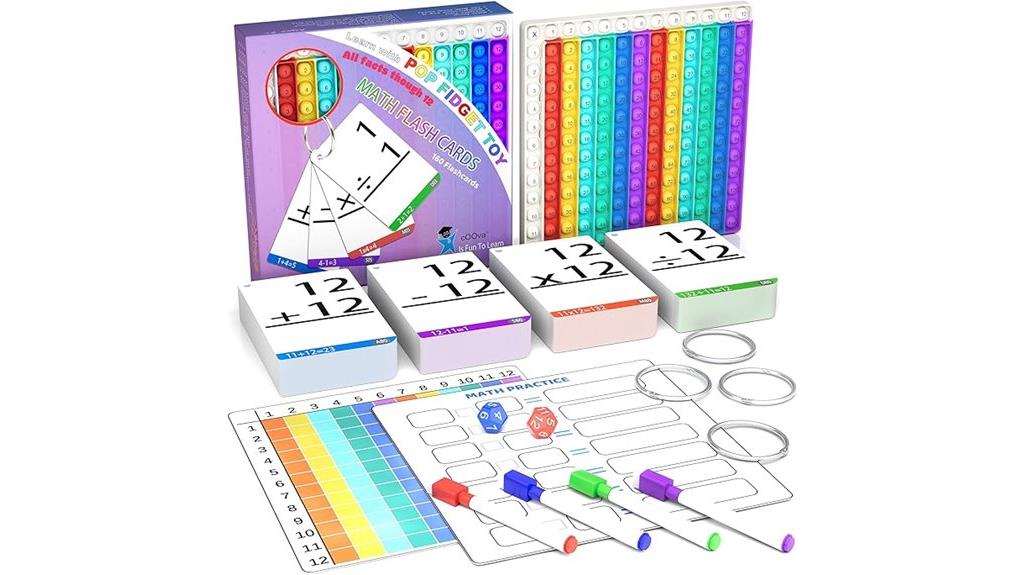
For parents and teachers seeking an engaging way to boost math skills in children aged 4 to 12, flash cards are an excellent choice. These tools make learning addition, subtraction, multiplication, and division interactive and fun, transforming abstract concepts into tangible activities. The set includes durable cards, versatile Pop It boards, and tactile multiplication mats, all designed to cater to various learning styles. Kids enjoy practicing with color-coded patterns, visual cues, and hands-on games, which boost confidence and retention. Highly rated and portable, these flash cards make math practice enjoyable whether at home, in the classroom, or on the go.
Best For: parents and teachers looking for an engaging, versatile, and effective way to improve math skills in children aged 4 to 12 through hands-on, interactive learning tools.
Pros:
- Durable, high-quality materials suitable for various environments including home, school, and travel
- Supports multiple learning styles with visual, tactile, and interactive activities
- Highly rated with positive feedback on boosting confidence, engagement, and math proficiency
Cons:
- May require adult supervision for younger children to maximize safety and learning effectiveness
- Some users might find the set’s variety overwhelming for very young children initially
- The need for additional storage or organization for the included accessories could be a minor inconvenience
Learning Resources Math Island Addition & Subtraction Game
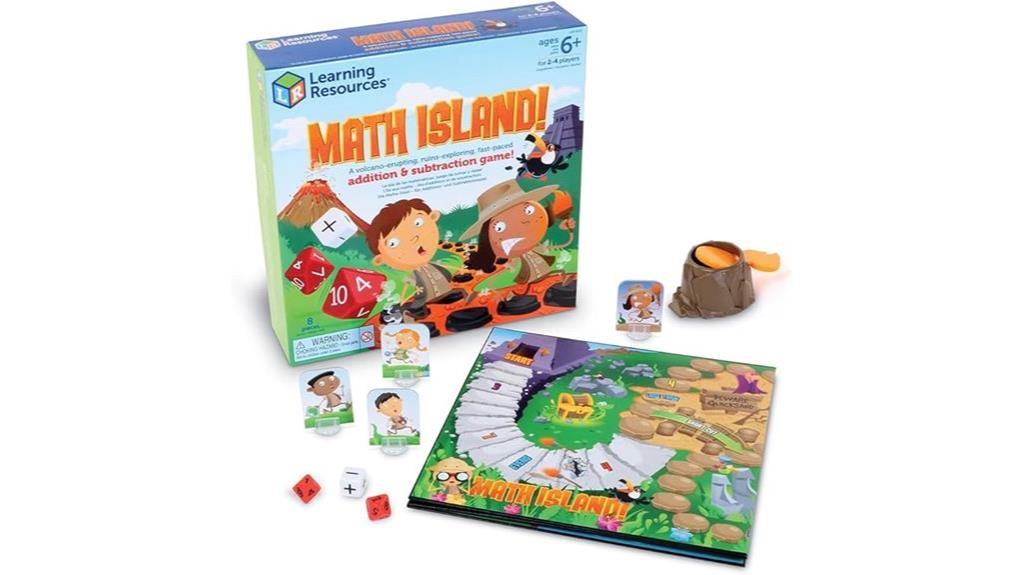
Are you looking for a fun way to boost your child’s confidence in math? I highly recommend the Learning Resources Math Island Addition & Subtraction Game. It turns math practice into an exciting adventure, helping kids build essential addition and subtraction skills with engaging gameplay. The game uses colorful components like dice and a volcano popper to create dynamic equations, keeping children motivated. Perfect for ages 6 and up, it encourages quick mental math and repeated play. Ideal for family nights or classroom use, this game makes learning math enjoyable and interactive, fostering both confidence and a love for numbers.
Best For: children ages 6 and up who want to develop their addition and subtraction skills through engaging and interactive gameplay.
Pros:
- Turns math practice into a fun and adventurous experience, increasing motivation.
- Uses colorful, high-quality components that appeal to young learners.
- Promotes quick mental math and confidence in basic arithmetic skills through repeated play.
Cons:
- May require adult supervision for younger children to fully understand game rules.
- The game is primarily focused on addition and subtraction, limiting exposure to other math concepts.
- Some players might find the game repetitive if played excessively without variations.
Alilo Math Games for Kids (Ages 5-12)
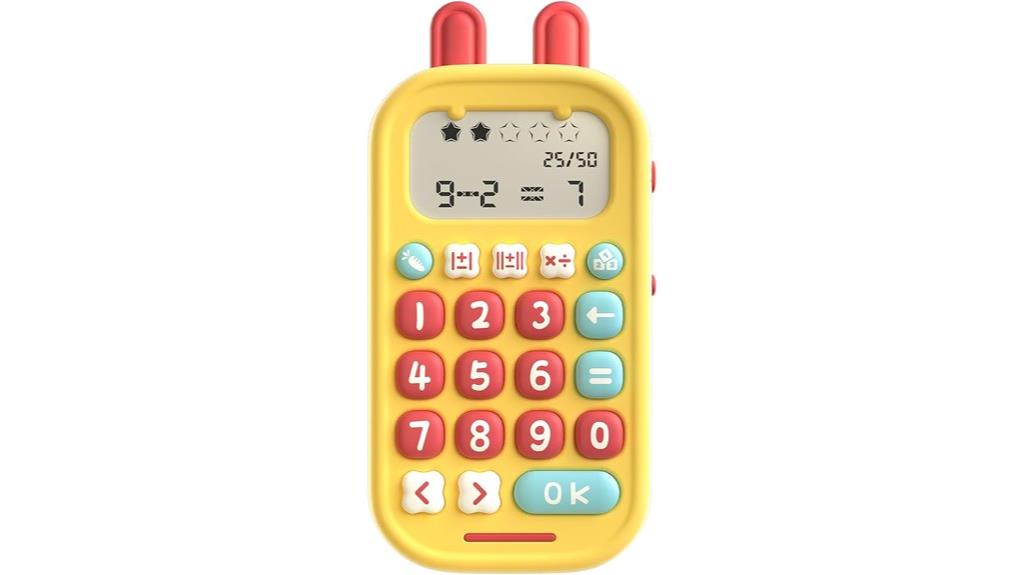
Looking for a math learning tool that keeps kids engaged and motivated? Alilo Math Games for Kids (Ages 5-12) offers 19 interactive games designed to develop logic and math skills. It includes activities like number memory, pattern recognition, and basic operations—addition, subtraction, multiplication, and division—with over 50,000 questions to keep variety high. Kids earn voice praise and star rewards, making learning feel like a game. Its simple, durable design with large buttons and silent mode makes it perfect for on-the-go practice. Parents praise its effectiveness, and children find it fun and engaging, helping improve speed and confidence in math.
Best For: parents and educators seeking a fun, engaging, and educational math tool for children aged 5-12 to reinforce math skills and boost confidence.
Pros:
- Includes 19 interactive games with over 50,000 questions for variety and long-term engagement
- Features instant voice praise, star rewards, and timed challenges to motivate children
- Durable, portable, and easy to use with large buttons, adjustable volume, and safety features
Cons:
- Requires 3 AAA batteries (not included), which may need frequent replacement with regular use
- May be less suitable for children outside the 3-12 age range or those with specific learning needs
- Limited to math-focused activities, so not a comprehensive educational device for other subjects
Number Puzzle Kindergarten Math Games and Learning Number Puzzles for Toddlers
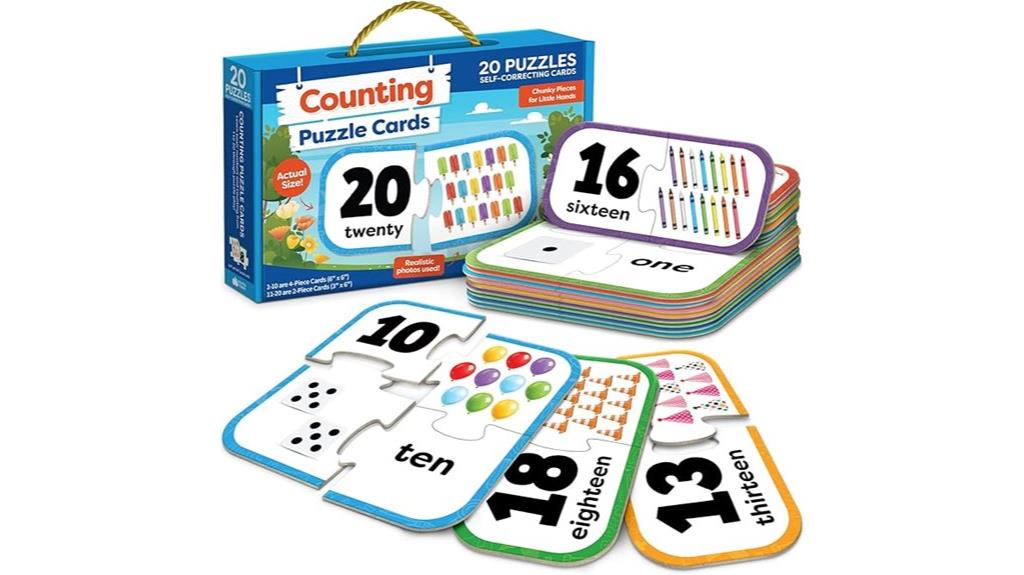
Number Puzzle Kindergarten Math Games are an excellent choice for parents and educators seeking engaging, screen-free activities that build early math skills. These puzzles feature 20 self-correcting pieces designed for toddlers aged 2-5, with vibrant visuals and toddler-friendly design. They help children recognize numbers, match images with words, and develop confidence in early math. The puzzles also improve fine motor skills, logic, and pattern recognition while promoting concentration and persistence. Made from durable, safe materials, they’re perfect for home, school, or travel. Overall, they make learning fun and easy, helping little ones build a solid math foundation through hands-on play.
Best For: parents, teachers, and caregivers seeking engaging, durable, and educational number puzzles to support early math development in children aged 2-5.
Pros:
- Self-correcting design helps children learn independently and build confidence.
- Vibrant visuals and toddler-friendly pieces make learning fun and engaging.
- Made from sturdy, safe materials that withstand frequent use at home or in classrooms.
Cons:
- Limited to numbers 1-20, which may require additional resources for advanced learners.
- Small pieces might pose a choking hazard for very young children without supervision.
- May require adult guidance for optimal learning, especially for younger toddlers.
Learning Resources STEM Explorers Pixel Art Challenge
The Learning Resources STEM Explorers Pixel Art Challenge is an excellent choice for children ages 5 and up who enjoy hands-on, creative learning experiences that combine art and STEM principles. It encourages critical thinking, problem-solving, and spatial reasoning through 10 challenge cards that increase in difficulty. Kids enhance fine motor skills, hand-eye coordination, and dexterity by carefully placing foam pieces to create patterns and designs. This activity also introduces foundational coding concepts and math skills in a tactile way. With 98 durable foam pieces, it offers a safe, versatile, and engaging way to explore STEM, art, and problem-solving without screens.
Best For: children ages 5 and up who enjoy hands-on, creative STEM learning activities that develop problem-solving, fine motor skills, and foundational coding concepts.
Pros:
- Promotes critical thinking, spatial reasoning, and problem-solving skills through engaging challenges.
- Includes durable foam pieces that are safe, lightweight, and easy for children to manipulate.
- Versatile for use in classrooms, homeschooling, or independent play with multiple difficulty levels.
Cons:
- May require adult supervision for younger children to ensure proper piece placement.
- Limited to tactile and visual learning, lacking digital or interactive components.
- The challenge cards’ increasing difficulty may require adult guidance for optimal engagement at higher levels.
Multiplication Puzzle Chart for Kids (22×22, 111 Pcs)
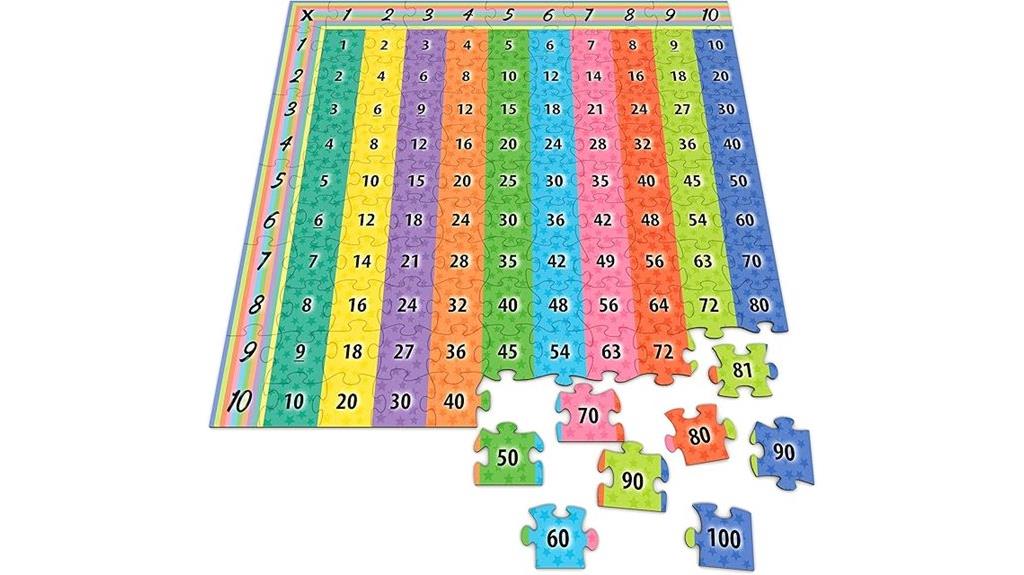
Children who are just starting to master multiplication will find the Multiplication Puzzle Chart 22×22 an engaging and effective learning tool. With its 111 color-coded pieces, it makes practicing multiplication facts interactive and fun. Kids can assemble the puzzle, recognize numbers, and explore different products, boosting their understanding and confidence. The large, durable pieces are perfect for small hands and help develop fine motor skills. Whether at home or in the classroom, this puzzle encourages creativity, problem-solving, and active learning. Its vibrant colors and versatile activities make mastering multiplication an enjoyable experience for children aged 7 and up.
Best For: children aged 7 and up, parents, teachers, and homeschooling families seeking an engaging and effective way to teach multiplication through hands-on activities.
Pros:
- Color-coded pieces enhance understanding of multiplication facts and improve number recognition.
- Large, durable, and safe for small hands, aiding fine motor development.
- Versatile for various activities like matching, sorting, and exploring multiplication concepts, making learning fun.
Cons:
- Requires space for assembly, which might be challenging in small areas.
- Some children may need adult guidance to maximize learning potential.
- The puzzle is primarily focused on multiplication, so additional math skills may need separate resources.
Proof! Math Game – Fast Paced Mental Math Magic
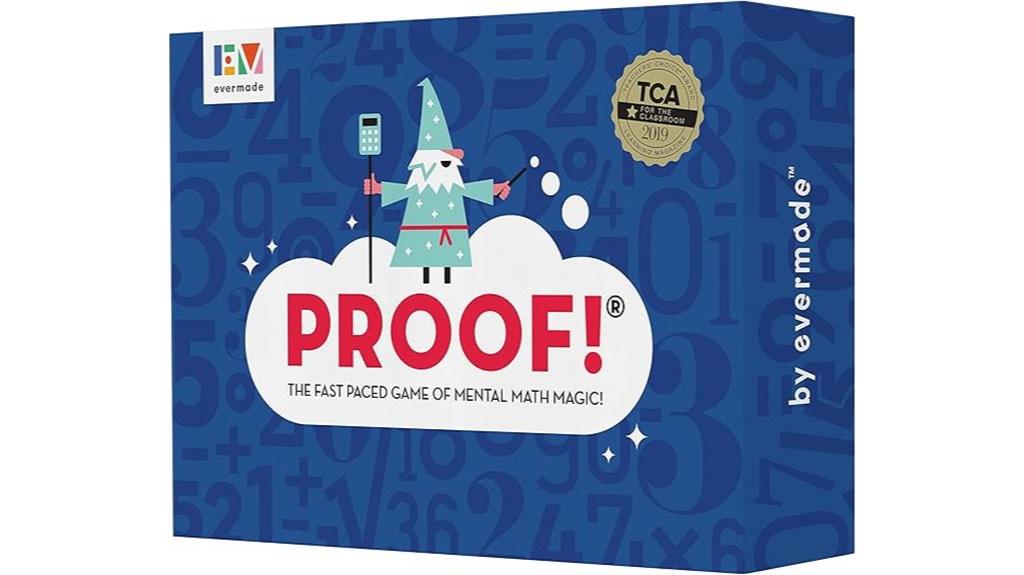
Looking for an engaging way to boost mental math skills quickly? Proof! Math Game is perfect for that. This fast-paced game is suitable for ages 9 and up and challenges players with multiplication, division, addition, subtraction, and square roots. It’s highly rated, with a 4.6-star average from over 2,200 reviews, and has won the Teachers’ Choice Gold Award. Its quick setup, portable size, and 10-15 minute gameplay make it ideal for family nights, classrooms, or travel. Players love its speed, fun challenge, and ability to improve mental calculation and critical thinking skills in a lively, interactive way.
Best For: educators, parents, and kids ages 9 and up seeking a quick, fun, and effective way to enhance mental math skills and critical thinking.
Pros:
- Highly engaging and fast-paced gameplay that keeps all players involved
- Promotes quick thinking, creative problem-solving, and math fact fluency
- Portable, easy to set up, and suitable for various settings including classrooms, family nights, and travel
Cons:
- Some users find the box quality to be lacking or less durable
- Price point may be high relative to the components included
- Rules are only available in English, which may pose a language barrier for some users
Learning Resources I Sea 10! Game for Math Practice
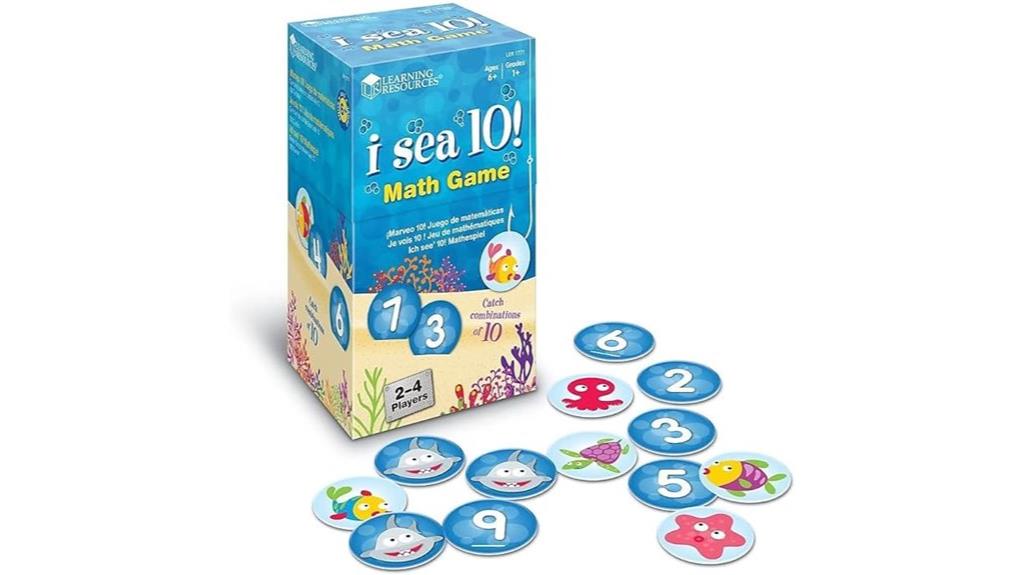
Are you searching for an engaging way to help kids strengthen their math skills while having fun? The Learning Resources I Sea 10! Game is perfect for ages 6 and up. It focuses on building number sense using a simple yet effective 10-based system. Players make combinations of number cards that sum to 10, encouraging addition practice and social interaction. With 90 number cards and 10 Shark cards, the game is easy to learn and suitable for both homeschool and classroom settings. It’s a fun, educational tool that promotes math confidence while fostering teamwork and strategic thinking. Kids won’t even realize they’re learning!
Best For: educators, parents, and caregivers seeking an engaging, age-appropriate math game to reinforce addition skills and social interaction for children ages 6 and up.
Pros:
- Promotes number sense and addition practice through a fun, interactive game
- Contains enough cards (90 number cards and 10 Shark cards) for multiple players and extended play
- Easy to learn, making it suitable for diverse settings including homeschool and classrooms
Cons:
- May require adult supervision or guidance for younger children to ensure proper gameplay
- Limited to practicing sums of 10, which might need to be supplemented with other math activities for comprehensive learning
- Playing multiple rounds could become repetitive without varied game variations
Factors to Consider When Choosing 7 Educational Puzzle Games That Make Math Fun
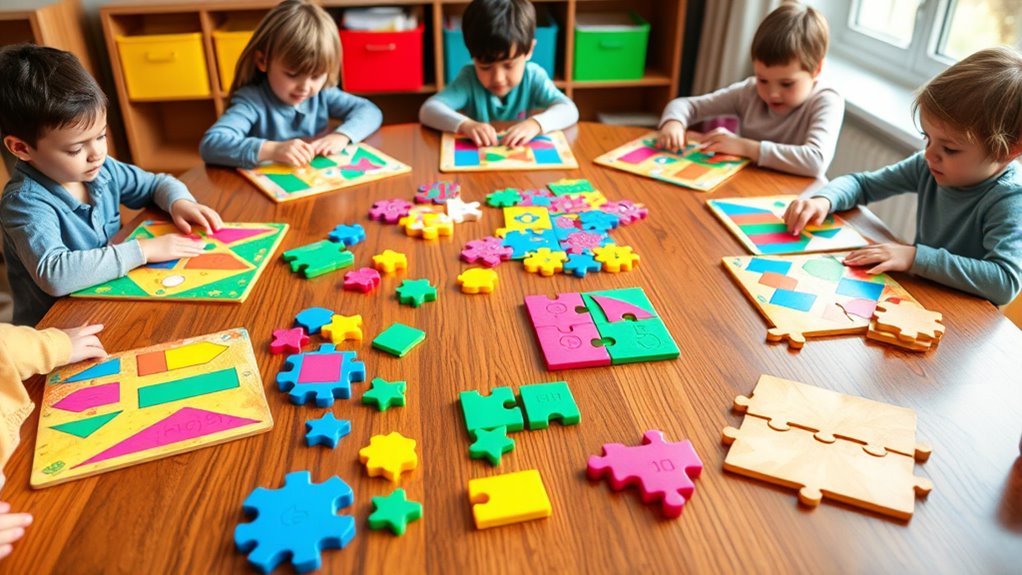
When choosing educational puzzle games to make math fun, I consider several key factors to guarantee they’re effective and safe. It’s important to match the game to the child’s age and skill level, while also checking for durability and engaging content. By focusing on these points, I can select games that are both enjoyable and educational.
Age Appropriateness
Choosing the right educational puzzle game depends heavily on whether it matches your child’s age and developmental level. I recommend selecting games designed specifically for your child’s age range, whether that’s preschoolers or older children, to guarantee the content is appropriate. Look for puzzles that introduce basic math concepts gradually, avoiding those that are too advanced or too simple. It’s also helpful if the game’s difficulty can be adjusted, so it can grow with your child’s skills. Safety is critical—check that materials are non-toxic and features like rounded edges are in place for younger kids. Finally, choose puzzles that match your child’s interests and attention span, so they stay motivated and engaged, making learning both fun and effective.
Skill Level Alignment
Matching the difficulty level of an educational puzzle game to your child’s current math skills is essential for keeping them motivated and avoiding frustration. When choosing a game, look for ones that offer adjustable challenge settings or multiple levels, so your child can progress at their own pace. Make sure the game is designed for your child’s age range to ensure the complexity is appropriate. Games with self-correcting features or immediate feedback help reinforce learning and build confidence. Additionally, consider how many challenge variations or difficulty modes are included, as this supports ongoing skill development. By aligning the game’s difficulty with your child’s abilities, you create an engaging learning experience that encourages growth without overwhelming them.
Durability & Safety
Durability and safety are crucial factors to take into account because children often handle puzzle games roughly or play with them in various environments. High-quality materials like thick cardboard, sturdy plastic, or laminated surfaces ensure the puzzles can withstand frequent use and rough handling. Safety features such as rounded edges, non-toxic inks, and certified materials help prevent injuries and guarantee the game is safe for young children. Self-correcting puzzles with secure interlocking joints reduce frustration and support independent learning while maintaining structural integrity. Additionally, compact, lightweight designs make puzzles easy to carry and store safely, minimizing damage risk. Certifications like ASTM F963 and CPSIA compliance further assure that the materials used are non-toxic and free from harmful chemicals, providing peace of mind for parents and educators alike.
Educational Content
Ever wonder how to pick the best educational puzzle games that make learning math both fun and effective? First, I look for games that cover core concepts like addition, subtraction, multiplication, division, and number recognition. These foundational skills are essential, so the puzzles should reinforce them clearly. I also verify the content aligns with age-appropriate standards, from early childhood to middle school. It’s important that games include features like self-correcting answers, visual cues, or clear feedback to support independent learning. Engaging themes or interactive elements help keep kids motivated and make math enjoyable. Additionally, incorporating multi-sensory or tactile components enhances engagement and reinforces concepts through hands-on experiences. These factors ensure the puzzles are both educational and enjoyable, promoting meaningful math skill development.
Engagement & Fun
Choosing engaging and fun educational puzzle games can make a significant difference in how children experience learning math. I’ve found that games with colorful visuals, interactive puzzles, and themed challenges capture kids’ attention and make math feel like an adventure. Incorporating timed tasks, rewards, or friendly competition boosts motivation and keeps kids excited to learn. Self-correcting puzzles with immediate feedback are essential—they build confidence and reduce frustration, encouraging kids to try again. Using diverse formats like movement-based activities, card challenges, and puzzles appeals to different learning styles and prevents boredom. Adding storytelling or thematic adventures transforms math practice into an immersive experience, encouraging sustained participation. Ultimately, choosing games that combine these elements creates a lively, engaging environment where kids love exploring math.
Portability & Storage
When selecting educational puzzle games for math, portability and storage are key factors to contemplate. I look for compact puzzles with small, lightweight pieces that are easy to carry around, making learning on the go simple. Durable storage containers or pouches are a big plus—they keep pieces organized and prevent loss during travel or when not in use. Foldable or flat puzzle boards are especially convenient, allowing me to pack games flat in backpacks or drawers, saving space. Modular or stackable sets help me store multiple games efficiently without clutter. Additionally, I prefer puzzles with minimal packaging or made from eco-friendly materials, which reduces bulk and supports sustainability. These features ensure the games are practical, easy to store, and ready whenever curiosity strikes.
Reusability & Quality
High-quality educational puzzle games are indispensable because they can withstand repeated use without losing their appeal or functionality. Durable materials like thick cardboard or sturdy foam ensure the puzzles remain intact after many sessions. Reusable puzzles often feature self-correcting designs or interlocking joints, allowing children to verify answers independently and reuse pieces without damage. Well-made puzzles also boast smooth edges, vibrant graphics, and secure fittings, enhancing safety and visual appeal. The durability of these puzzles means they maintain their shape, color, and integrity over time, maximizing educational value. Investing in high-quality, reusable puzzles reduces the need for replacements, making them a cost-effective choice for sustained learning and play. Overall, quality and reusability are crucial for long-term engagement and educational success.
Price & Value
Considering the importance of durability and engaging design, it’s equally essential to evaluate the price and overall value of educational puzzle games that make math fun. I look at the balance between cost and the educational benefits offered, ensuring I get enough activities or puzzle pieces for the price. Comparing the cost per piece or activity helps me determine if the game is worth it, especially if it includes durable materials and versatile features for long-term use. I also consider whether the price aligns with similar products in the market, so I know I’m getting a fair deal. Don’t forget to factor in any extra costs, like accessories or replacement parts, which can influence the overall value over time. This approach helps me select puzzles that are both affordable and enriching.
Frequently Asked Questions
How Do Puzzle Games Improve Long-Term Math Retention?
Puzzle games improve long-term math retention by engaging my brain in active problem-solving and critical thinking. When I solve puzzles, I reinforce concepts through repetition and application, which helps transfer knowledge to long-term memory. The fun and challenge keep me motivated, making it easier to remember strategies and formulas. Plus, the interactive nature of puzzles creates stronger mental associations, ensuring I retain math skills better over time.
Are These Games Suitable for Homeschooling Environments?
Yes, these puzzle games are perfect for homeschooling because they make learning math interactive and enjoyable. I find they encourage independent problem-solving and critical thinking, which are essential skills. Plus, they can be easily integrated into lesson plans or used as fun supplementary activities. I recommend choosing games that match your child’s skill level to keep them engaged and motivated, making math both accessible and exciting at home.
What Age Group Benefits Most From These Educational Puzzles?
Young learners, especially ages 6 to 12, are like sponges, soaking up the vibrant colors and puzzling challenges these games offer. I see them ignite curiosity, transforming math from a formidable mountain into a playful valley to explore. These puzzles act as bridges, guiding children through abstract concepts with joy and discovery, making this age group the perfect audience to benefit from engaging, educational math games that spark a lifelong love for learning.
Can These Games Support Special Learning Needs?
Yes, these puzzle games can support special learning needs. I’ve seen how they adapt to different abilities, offering adjustable difficulty levels and visual aids that help students with learning differences. They promote engagement and build confidence, making math accessible and fun for everyone. If you customize the experience, these games become powerful tools for supporting diverse learners, helping them develop skills at their own pace.
How Do I Choose the Best Puzzle Game for My Child’s Skill Level?
To choose the best puzzle game for my child’s skill level, I start by evaluating their current abilities and interests. I look for games that challenge them without causing frustration, offering adjustable difficulty levels. I also read reviews and try demos when possible. Watching how they interact with the game helps me determine if it’s the right fit, ensuring they stay engaged while learning and having fun.
Conclusion
So, if you’re looking to make math feel like an exciting adventure, these puzzle games are your best allies. They’re like a treasure map guiding kids through the world of numbers with curiosity and confidence. Whether your child is just starting out or ready for a challenge, these games turn learning into an engaging journey. Trust me, making math fun is the secret to helping kids shine bright like a star in the night sky.








